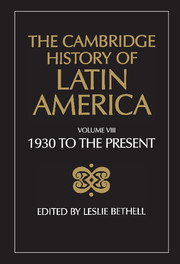6 - Chile since 1958
from PART TWO - CHILE
Published online by Cambridge University Press: 28 March 2008
Summary
Since 1958, Chile has been ruled by four administrations (three elected, the fourth and longest imposed by a military coup), profoundly different in their ideologies and political aims, social basis and economic policies. The government of Jorge Alessandri, elected in 1958, was conservative and pro-business. Its support came from the private sector of the economy, from landowners (and the substantial peasant vote they still controlled), from sectors of the urban poor still ignored by the Marxist parties (Socialist and Communist) and by the Christian Democrats, and from the urban middle class, disillusioned with the Radicals, who had dominated political life from the Popular Front of 1938 to the election of Ibá¯nez in 1952, and not yet won over to the Christian Democrats. Alessandri proved incapable of dealing with Chile's persistent and increasing economic and social problems, and in 1964 Eduardo Frei, a Christian Democrat, was elected president.
Promising a ‘revolution in liberty’ the Partido Demócrata Cristiano (PDC) offered economic modernization combined with social justice and reform and the pursuit of class harmony. Even though the PDC enjoyed almost unprecedented electoral and congressional support (though without a majority in the Senate), the contradictions produced by trying to secure all those objectives, coupled with increasing ideological conflict and political strife, proved too much even for the able technocrats brought into the state apparatus. The threat of further reform and the electoral collapse of the Right in 1965 pushed the divided right-wing parties, Liberals and Conservatives, into the new and influential National Party.
- Type
- Chapter
- Information
- The Cambridge History of Latin America , pp. 311 - 382Publisher: Cambridge University PressPrint publication year: 1991
References
- 1
- Cited by

